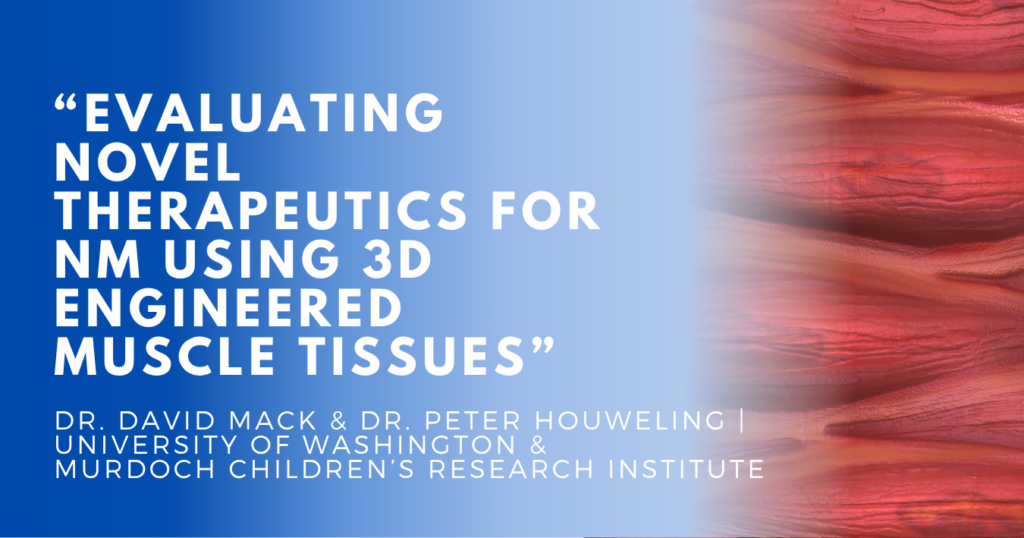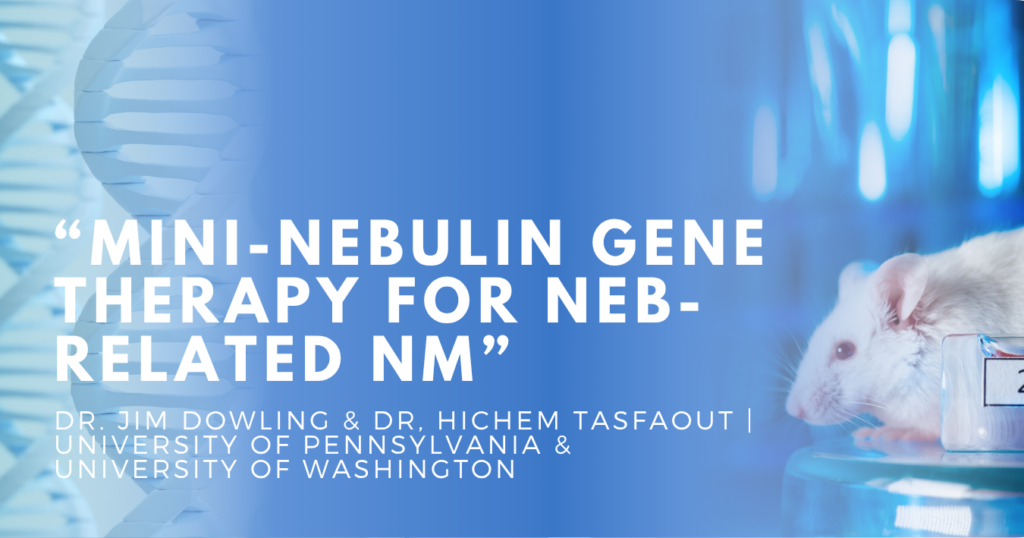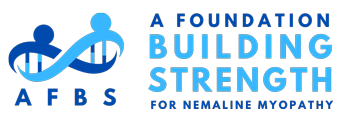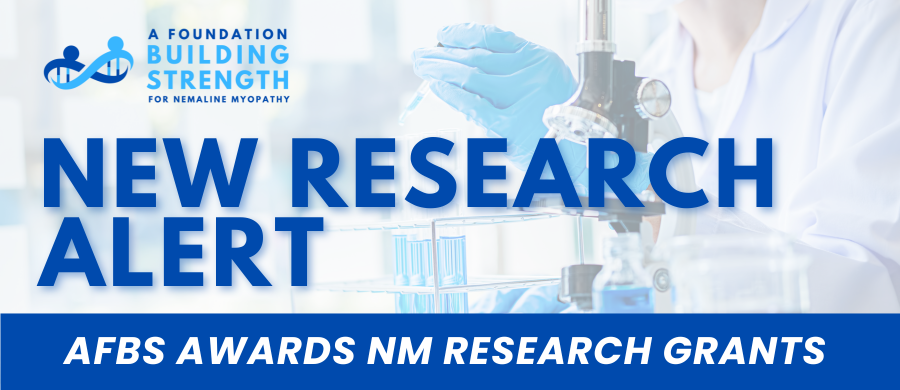A Foundation Building Strength is thrilled to announce our latest round of newly funded Nemaline Myopathy research projects. After a formal Call for Applications that resulted in several promising proposals, our Scientific Advisory Board, with the help of many experts in their respective fields, completed a robust vetting process.
We are proud to announce three of the outstanding projects selected, representing a multi-pronged approach for finding effective treatments for Nemaline Myopathy. These projects are significant, multi-year investments, with each research team being awarded a grant of $100,000 per year for the next three years. We are incredibly optimistic about this new portfolio and its potential to propel science forward and bring us closer to effective treatments.
Here is a look at the new research our donors are making possible.
Our Newest AFBS-Funded Projects
1. Evaluating Novel Therapeutics for NM Using 3D Engineered Muscle Tissues

- Principal Investigators: David Mack, PhD and Peter Houweling, PhD
- Institution: University of Washington and the Murdoch Children’s Research Institute
Treatment development for Nemaline Myopathy (NM) has been slowed by two major challenges: limited understanding of how the disease affects muscle cells beyond the known genetic mutations, and the insufficient diversity of lab models that allow researchers to test new therapies efficiently.
Using the 3D engineered ACTA1 muscle tissue models developed through a previous AFBS-funded grant, this new international research project aims to overcome both barriers. The team will further develop these renewable, lab-grown muscle models called Engineered Muscle Tissues (EMTs) that mimic the muscle function of people with NM. These models will enable scientists to study how NM develops at the cellular level and test new treatment ideas much faster than before.
The researchers will first focus on ACTA1-related NM, using their EMTs to test multiple potential treatments side by side and measure how well each improves muscle function. This approach offers a faster and more cost-effective way to identify the most promising therapies before moving to animal or human studies.
Importantly, the team’s work will also pave the way for creating similar models for all NM subtypes. This international research effort will first attempt to create EMTs mimicking NEB-related and CFL2-related NM, expanding the impact of this research.
By developing these advanced tools and testing strategies, this project has the potential to transform how NM treatments are discovered and refined.
2. Advancing Universal AAV-Based Gene Therapy for All ACTA1 Patients

- Principal Investigator: Afrooz Rashnonejad, PhD
- Institution: Nationwide Children’s Hospital
The ACTA1 gene plays a vital role in muscle health by making a protein called skeletal muscle alpha-actin, which is essential for normal muscle contraction and strength. When this gene is mutated, it causes ACTA1-related Nemaline Myopathy, one of the most common forms of the condition .
Recent research suggests that specific ACTA1 mutations may also affect the heart. Some patients develop dangerous heart problems, possibly because the faulty ACTA1 protein interferes with cardiac actin (ACTC1), the main protein that keeps the heart muscle functioning properly.
Dr. Rashnonejad and her team are working to develop a universal gene therapy that could help all patients with ACTA1 mutations, including those who have heart involvement. To prepare this therapy for clinical trials, the team will create heart cells from patient stem cells to study how ACTA1 mutations impact the heart and to see whether their gene therapy can prevent or reverse heart damage. In parallel, they will test the therapy in mouse models of ACTA1 disease at different ages and doses to determine the most effective and safest treatment strategy to prevent both skeletal and cardiac muscle disease.
These studies are a critical step toward developing a life-changing gene therapy that could address both muscle and heart complications in ACTA1-related Nemaline Myopathy, ultimately improving outcomes and survival for affected patients.
3. Mini-Nebulin Gene Therapy for NEB-Related NM

- Principal Investigators: James Dowling, MD, PhD, and Co-PI, Hichem Tasfaout, PhD
- Institutions: University of Pennsylvania and the University of Washington
There are currently no approved treatments for NEB-related Nemaline Myopathy (NM), the most common form of NM. The NEB gene is responsible for producing nebulin, a large and essential protein that helps muscles contract and function properly. Because the NEB gene is extremely large, developing an effective therapy has been especially difficult.
This new research project aims to create the first-ever gene therapy for NEB-related NM and to test its effectiveness in a mouse model of the disease. The research team has developed an innovative protein-stitching approach that allows smaller pieces of the protein-coding NEB gene to be delivered separately and then assembled into a functional protein version within muscle cells.
This breakthrough strategy overcomes one of the biggest obstacles in NEB research, the fact that the full NEB gene is too large to fit into the viral vectors typically used for gene therapy delivery.
If successful, this work could represent a major leap forward in the treatment of NEB-related NM and serve as a foundation for developing genetic medicine approaches for other large, complex genes that cause rare muscle diseases.
Meet the Researchers: A Special Research Update Webinar!
Saturday, November 15th community members, supporters, and researchers joined some of the scientists leading AFBS funded projects for a special Nemaline Myopathy Research Update Webinar highlighting our latest research investments!
This was a rare opportunity to hear directly from some of the investigators leading our newest AFBS-funded research projects—including Dr. Afrooz Rashnonejad, Dr. David Mack, and Dr. Tina Duong of the NM Natural History Study.
They shared their discoveries and next steps on the path toward effective treatments. Whether you’re a family, researcher, or supporter, don’t miss your chance to hear how AFBS-funded research is driving progress by watching the full recording (includes audience Q & A).
A Foundation Building Strength (AFBS) is a nonprofit organization dedicated to accelerating the development of treatments for Nemaline Myopathy. Our mission is to fund cutting-edge research to find effective treatments while providing resources and a strong community for families affected by NM. We are proud to be at the forefront of driving Nemaline Myopathy research breakthroughs forward through collaborative efforts with research teams all over the world.
Donate to AFBS: Your monetary gift will support critical research and provide vital resources for NM families.
Stay Connected: Sign up for our email list to receive the latest updates from AFBS and learn more about NM research. Are you an individual or a caregiver of an individual affected by NM? Fill out the AFBS Contact Survey to be connected with valuable resources, support, and research opportunities! Visit our “Get Involved” page for even more ways to connect!

